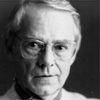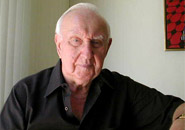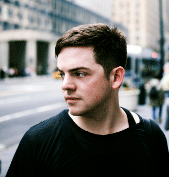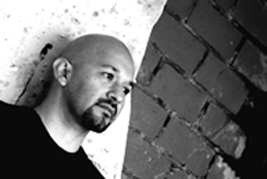
Jack Beeson was born on July 15, 1921 and received his early education in Muncie, Indiana. He studied composition at the Eastman School, completing Bachelor’s and Master’s degrees. Upon winning the Prix de Rome and a Fulbright Fellowship Beeson lived in Rome from 1948 through 1950 where he completed his first opera, Jonah, based on a play by Paul Goodman. Beeson then adapted a work by the well-known American playwright, William Saroyan, for Hello Out There, a one act chamber opera produced by the Columbia Theater Associates in 1954.
The Sweet Bye and Bye, with a libretto by Kenward Elmslie, was produced by the Juilliard Opera Theater in 1957. It concerns the leader of a fundamentalist sect and her conflict between duty and love. The central character, Sister Rose Ora, resembles famous religious leader Aimee Semple MacPherson. The score includes marching songs, hymns, chants, and dances, as well as memorable arias and ensembles.
Beeson’s next opera, Lizzie Borden, again based on an American subject, was commissioned by the Ford Foundation for the New York City Opera. Lizzie Borden tells the familiar story with less emphasis on the ax murders than on “the psychological climate that made them inevitable”, according to critic Robert Sherman. In American Opera Librettos, Andrew H. Drummond writes, “This opera has an obvious dramatic effectiveness in which a clear and direct development with tightly drawn characterization leads to a powerful climax.” New York City Opera premiered Lizzie Borden in 1965, and it was produced for television by the National Educational Television Network in 1967 using the original cast. A new NYCO production opened in March 1999 and was telecast by PBS.
With 1975’s Captain Jinks of the Horse Marines, Beeson found a gifted collaborator in Broadway lyricist (and also composer and translator) Sheldon Harnick. Several years later, the two hit on a possible subject, Clyde Fitch’s romantic comedy about a wager on the virtue of a prima donna which leads to true love. Captain Jinks of the Horse Marines was premiered by the Lyric Opera of Kansas City in 1975, and featured in the catalog accompanying Opera America’s Composer-Librettist Showcase in Toronto. (more…)



 John Luther Adams has been named the 2010 winner of the $100,000 Michael Ludwig Nemmers Prize in Music Composition. The announcement was made today at the Northwestern University Henry and Leigh Bienen School of Music. The biennial award honors classical music composers of outstanding achievement who had a significant impact on the field of composition. Past winners include John Adams (2004), Oliver Knussen (2006) and Kaija Saariaho (2008).
John Luther Adams has been named the 2010 winner of the $100,000 Michael Ludwig Nemmers Prize in Music Composition. The announcement was made today at the Northwestern University Henry and Leigh Bienen School of Music. The biennial award honors classical music composers of outstanding achievement who had a significant impact on the field of composition. Past winners include John Adams (2004), Oliver Knussen (2006) and Kaija Saariaho (2008).
